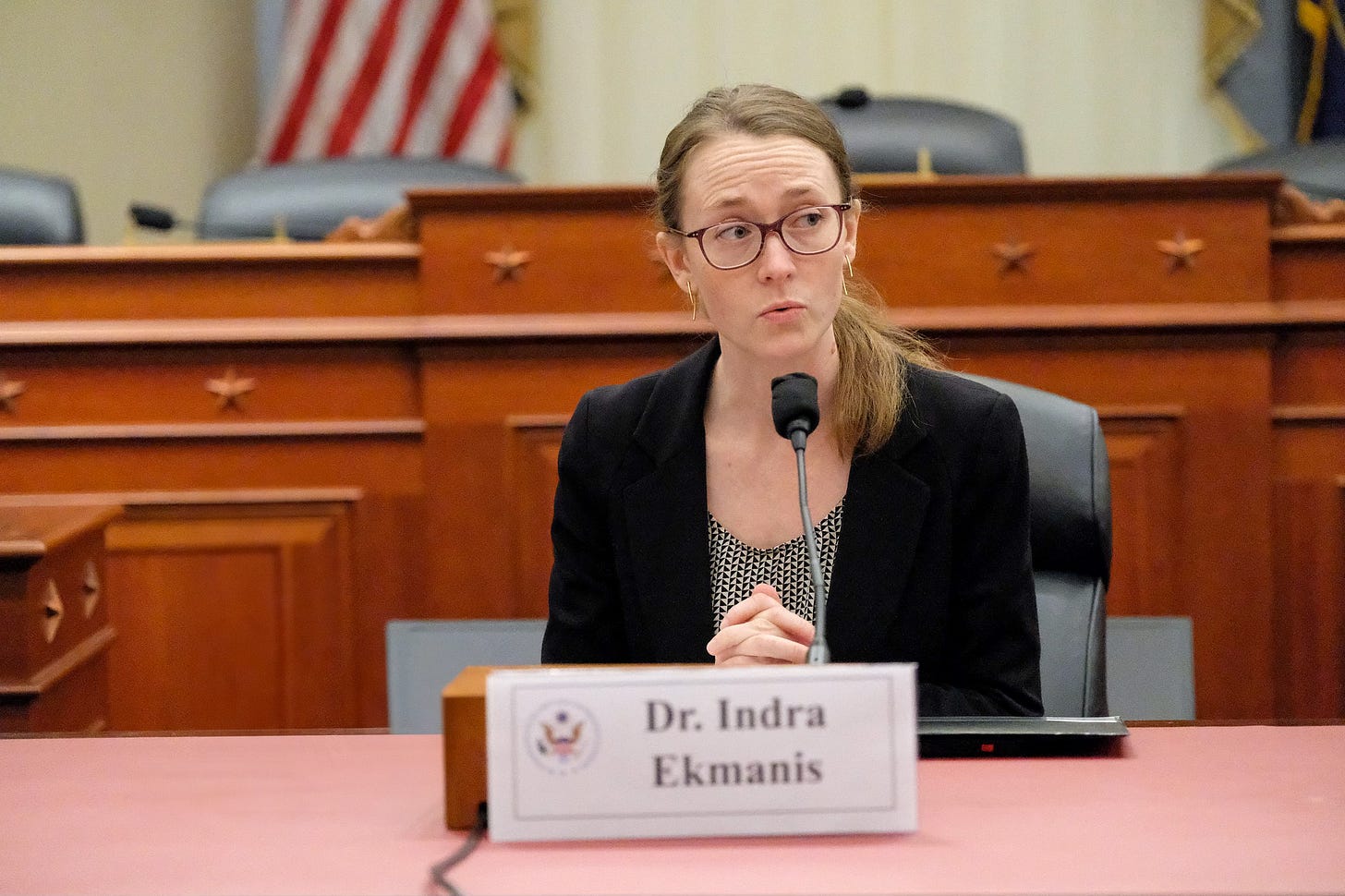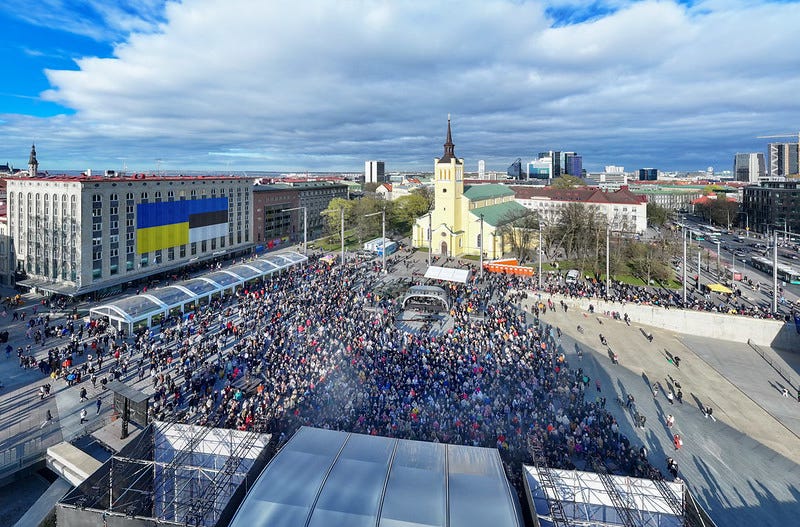Contesting Russia: The Baltic Perspective
By Indra Ekmanis - The Baltic states have responded to Russian aggression by turning areas of risk into areas of expertise.

This week, Dr. Indra Ekmanis participated in a US Helsinki Commission briefing, “Contesting Russia: Lessons from Central & Eastern Europe.” Read her opening remarks below as she highlights how the Baltic states play an essential role in shaping a secure and resilient Europe and their response to heightened Russian aggression.
Estonia, Latvia, and Lithuania, while comparatively small countries with a combined population of just six million, make up a key strategic region bridging the West and Russia. Among their strongest unifying factors are their experiences under five decades of repressive Soviet occupation, their post-Soviet reversion to liberal democracies, accession to critical international institutions the EU and NATO in 2004, their responses to a revanchist Russia on their borders, and currently, their leadership and iron-clad military, humanitarian, and political support for Ukraine in its war against Russian aggression.
In the Baltic states, Russian aggression has effectively operated in the gray zone, skirting the edges of what might trigger NATO’s Article 5 and taking the form of cyber attacks, disinformation campaigns, military provocations, and exertions of political and economic pressure on the countries. The Baltic states, in turn, have responded by turning areas of risk into areas of expertise: for example, by establishing the NATO Centers of Excellence for Cyber Defense in Estonia (2008), which weathered the world's first large-scale cyber attack from Russia on government and society in 2007; on Energy Security in Lithuania (2012), where previous dependency on Russia left the country vulnerable to energy blackmail; and on Strategic Communications in Latvia (2014), where ethnolinguistic divisions have exposed the population to Russian disinformation assaults. While there is much room to strengthen these efforts — and to do so in partnership with the US and other allies — Baltic perspectives offer key lessons for countering Russia today.
First, is the Baltic understanding of NATO as an effective bulwark against Russia. While initially largely recipients of NATO's collective defense, the Baltic countries have now emerged as leaders in the Alliance and are taking an active role in strengthening deterrence on the eastern flank through their own defensive posture. Since 2014, the Baltic states have accelerated defense spending — their 2025 budgets foresee more than 3% of GDP on defense and they are actively encouraging NATO partners to increase their spending. (Twenty-three of 31 allies are expected to meet NATO's 2% target in 2024, and estimates show that Poland and Estonia are set to edge out the US.) Since the full-scale war in Ukraine began, they have undertaken multiple military procurement projects, including deep-strike capabilities that would put St. Petersburg within range of guided missiles from Estonia, and building a land-based counter-mobility area — the Baltic Defense Line — to slow potential incursion of enemy forces. Active lobbying from the countries has increased NATO allies' presence in the region, including work to upgrade enhanced forward presence battalions to brigades on either permanent, persistently deployed, or high-readiness bases in Lithuania, Latvia and Estonia, respectively. Continued defense cooperation with the US, including through the funding for the Baltic Security Initiative, is a critical component of these collective security and deterrence efforts.
As direct targets of Russian hybrid warfare, the Baltic countries have adopted defense models that include not only developing military capabilities, but also a whole-of-government and whole-of-society approach. This includes establishing public-private cooperation, introducing national defense curriculum, enabling population readiness, bolstering psychological defenses, and securing strategic communications and economic and energy resilience. Some tangible examples of this include cyber-security education, civil defense drills, the expansion of national service, and forward-thinking energy infrastructure development enabling diversification and a pivot away from reliance on Russia.
This whole-of-society approach is possible because of the Baltic states’ successful post-Soviet transition since regaining their independence from the Soviet Union in the 1990s — including integration with the European Union and NATO since 2004. The Baltic states have developed a strong rule of law, ranking highly in global indices, and on some indicators outperforming the US. This has been a remarkably rapid and stable transition, and today, the Baltic states stand out for their progressive political systems compared to much of the rest of Europe where fringe parties are gaining traction. Similarly, the Baltic states support a robust civil society — seen, for example, in the local response to supporting Ukrainian refugees.
A strong democracy, engaged civil society, and high quality of life are critical components of countering Russia.
Part and parcel of this is their work to counter disinformation and better integrate society. In Estonia and Latvia, ethnolinguistic cleavages have been key leverage points for Russia, which exploits so-called “compatriots” and seeks to paint the Baltic states as failing democracies. This narrative is subverted not only through media literacy education, debunking efforts, and achievements in social integration but also through lived experiences. When Russian-speaking populations — who are, importantly, diverse in identity and ideology in their own right — can contrast the quality of life, opportunity, freedom, and peace in the Baltic states with the realities of Russians living just across the border, the impact of “failing state” narratives is blunted. There is a takeaway here for Americans as well, where improving the social and economic safety net helps mitigate existing divisions in society and builds a population that is less vulnerable to exploitation by Russian information manipulation. A strong democracy, engaged civil society, and high quality of life are critical components of countering Russia.
The Baltic states know that a strong and resilient NATO — one that offers maximum support to and eventually includes Ukraine — is critical to countering Russia.
When the Baltic states joined NATO in 2004, there were some who argued that the expansion of the military alliance was provoking the Russian bear. These arguments resurfaced in the wake of Russia's full scale invasion of Ukraine in 2022. This is a concerning narrative — not only because the arguments prioritize the comfort of the aggressor and diminish agency and self-determination of sovereign states — but also because the argument has already been proven wrong, with Ukraine as the devastating counterfactual. The Baltic states know that a strong and resilient NATO — one that offers maximum support to and eventually includes Ukraine — is critical to countering Russia.
Perhaps the fundamental lesson from the Baltic experience — which went unheeded for too long — is a clear-eyed understanding of today’s Russia and the worldview in which it is steeped: Russia's perception of international affairs relies on opposition — “Russia versus the West.” Soft power is not an effective deterrent. Interdependence heightens, rather than mitigates, risk. Appeasement does not and will not bring peace — rather, it emboldens aggressors and results in oppression and future conflict.
The Baltic countries have long been testing grounds for the hybrid tactics Russia has gone on to use elsewhere — including in Georgia, Ukraine, and also the US. Now, it is imperative that Baltic warnings continue to resonate with policymakers at the highest level and with their broad electorates — not as paranoia from traumatized states, but as a key insight into the nature of an aggressive neighbor with expansive imperial ambitions predicated on infringing on territorial sovereignty and manipulating government and society.
Video of the full briefing is available here.
Indra Ekmanis is the Editor of FPRI's Baltic Bulletin, host of the Baltic Ways podcast, and a Baltic Sea Fellow in the Eurasia Program at the Foreign Policy Research Institute.





